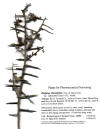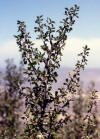|
Ziziphus obtusifolia
var. canescens |
Ziziphus obtusifolia
var. canescens |
|
Ziziphus obtusifolia
var. canescens |
Ziziphus obtusifolia |
|
Ziziphus parryi var.
parryi
|
Ziziphus parryi var.
microphylla
|
|
Huang X., A. Kojima-Yuasa, T. Norikura, D. O. Kennedy, T. Hasuma and I. Matsui-Yuasa. 2007. Mechanism of the anti-cancer activity of Zizyphus jujuba in HepG2 cells. Am. J. Chin. Med. 35(3): 517–532. “The Zizyphus jujuba fruit has been used as a traditional Chinese medicinal herb and considered to affect various physiological functions in the body for thousands of years. However, its anti-cancer activity and mechanism of action remain to be elucidated. We investigated the anti-cancer activity of Zizyphus jujuba Mill and its underlining mechanisms of action in human hepatoma cells (HepG2) and found that the extract of Z. jujuba decreased the viability of the cells. Further extraction of the initial Z. jujuba extract with organic solvents revealed that the chloroform fraction (CHCl(3)-F) was the most effective. Interestingly, the CHCl(3)-F induced not only apoptosis but also G1 arrest at a low concentration (100 mug/ml) and G2/M arrest at a higher concentration (200 mug/ml) by cell cycle assay. Apoptosis, an increase in intracellular ROS (reactive oxygen species) level, a decline of mitochondrial membrane potential at low Z. jujuba concentrations, and a ROS-independent mitochondrial dysfunction pathway at high concentrations were all observed. CHCl(3)-F-induced G1 arrest in HepG2 cells was associated with an increase in hypohosphorylation of Rb and p27(Kip1), and a decrease of phosphorylated Rb. However, CHCl(3)-F-induced G2/M arrest in HepG2 cells correlated with a decrease of the p27(Kip1) levels and generation of the phosphorylation of p27(Kip1), however the hypohosphorylation of Rb protein remained. Collectively, our findings suggest that the CHCl(3)-F extract of Z. jujuba extract induced a concentration dependent effect on apoptosis and a differential cell cycle arrest in HepG2 cells.” |
|









